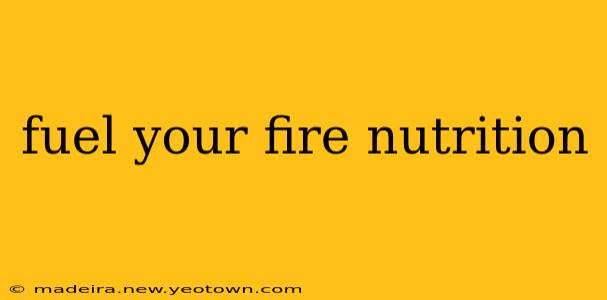We've all been there. That midday slump, the afternoon energy crash, the feeling of being constantly sluggish. It's a common experience, but it doesn't have to be your reality. The key to unlocking consistent energy, improved focus, and a vibrant, healthy life lies in understanding how to properly fuel your fire – your body – through strategic nutrition. This isn't about restrictive diets or quick fixes; it's about building a sustainable relationship with food that empowers you to live your best life.
This journey begins with understanding your individual needs. What works for one person might not work for another, and that's perfectly okay. This guide will provide a solid foundation, helping you explore what fuels your fire and how to optimize your nutrition for peak performance. Think of it as a personalized roadmap, guiding you towards a healthier, more energetic you.
What are the best foods to fuel my body?
This is the million-dollar question, and the answer isn't a simple list. The best foods are those that provide a balanced mix of macronutrients – carbohydrates, proteins, and healthy fats – along with essential vitamins and minerals. Imagine your body as a high-performance engine; it needs the right fuel to run optimally.
Think of it like this:
-
Carbohydrates: These are your body's primary source of energy. Focus on complex carbohydrates like whole grains (brown rice, quinoa, oats), fruits, and vegetables. These release energy slowly, preventing those dreaded energy crashes. Avoid refined carbohydrates like white bread and sugary drinks, which lead to spikes and then dips in blood sugar.
-
Proteins: Essential for building and repairing tissues, proteins are crucial for muscle growth, hormone production, and overall bodily function. Excellent sources include lean meats (chicken, fish), beans, lentils, eggs, and tofu. Aim for a balanced intake throughout the day.
-
Healthy Fats: Don't shy away from fats! Healthy fats are vital for brain function, hormone regulation, and nutrient absorption. Include sources like avocados, nuts, seeds, olive oil, and fatty fish (salmon, mackerel).
What should I eat before a workout?
Pre-workout nutrition is critical for optimal performance. You need energy to fuel your workout and nutrients to support muscle function and recovery. A good pre-workout snack should be easily digestible and provide a mix of carbohydrates and some protein. Examples include:
- A banana with a handful of almonds
- A small bowl of oatmeal with berries
- A protein smoothie with fruit
What should I eat after a workout?
Post-workout nutrition is just as important as pre-workout fuel. Your muscles are depleted after exercise and need replenishing to repair and rebuild. Focus on consuming a combination of carbohydrates and protein to replenish glycogen stores (your body's energy source) and promote muscle protein synthesis. Good options include:
- A protein shake with fruit
- Greek yogurt with granola
- Chicken breast with brown rice
What are some healthy snacks to keep my energy levels up throughout the day?
Healthy snacking is key to avoiding those energy dips. Choose snacks that are nutrient-dense and satisfying, preventing overeating later on. Some excellent options include:
- Fruits (apples, bananas, berries)
- Vegetables (carrots, celery, bell peppers) with hummus
- Nuts and seeds
- Greek yogurt
- Hard-boiled eggs
How can I improve my gut health through nutrition?
Gut health is increasingly recognized as a cornerstone of overall well-being. A healthy gut microbiome supports digestion, immunity, and even mental health. Focus on consuming foods rich in prebiotics (fiber that feeds beneficial gut bacteria) and probiotics (live bacteria that support gut health). Examples include:
- Yogurt with live cultures
- Kimchi
- Sauerkraut
- Kefir
- High-fiber fruits and vegetables
What are some common nutrition myths I should be aware of?
There's a lot of misinformation out there about nutrition. It's essential to be critical of the information you consume and rely on credible sources. Some common myths to be aware of include:
- All carbs are bad: This is false. Focus on complex carbohydrates, not refined ones.
- Fat makes you fat: Healthy fats are essential for your body.
- Detox teas and cleanses are necessary: Your body has its own detoxification system.
- Skipping meals is a good way to lose weight: This can lead to overeating later and can disrupt your metabolism.
This guide provides a starting point for fueling your fire through nutrition. Remember, consistency is key. Start by making small, sustainable changes, and gradually incorporate healthier choices into your daily routine. Listen to your body, pay attention to how different foods make you feel, and adjust your approach accordingly. Your body will thank you for it!

